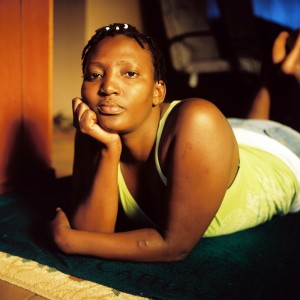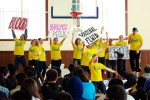When Professor David Gere began showing students a book, “A Broken Landscape,” he was met with a visible reaction, seen in their tears and heard in their responses.
Compiled by South African, London-based photographer Gideon Mendel, the book pairs together images of people living with HIV with their first-person narratives. Gere said his students couldn’t help but be moved.
A world arts and cultures professor and executive director of the UCLA Art and Global Health Center, Gere contacted Mendel in 2007 and organized a workshop with him at UCLA. There, students took photographs and conducted interviews, similar to Mendel’s project in sub-Saharan Africa, but in Los Angeles.

(Courtesy of Gideon Mendel)
This began the UCLA Art and Global Health Center’s “Through Positive Eyes” advocacy project, co-directed by Mendel, which has now visited seven cities from Mexico City to Bangkok. In each city, Gere said the team asks people living with HIV to represent themselves by taking photographs and sharing stories of their own lives, so that others can have a deeper understanding of what their lives are and be less afraid of HIV and AIDS as a larger syndrome.
Although the center has hosted annual commemorative events, Gere said for World AIDS Day 2014, the center decided to make “Through Positive Eyes” the core of the event.
“We have never in the past focused on the ‘Through Positive Eyes’ projection and we decided it was time because we are bringing the project to fruition,” Gere said. “We are arriving at our ninth city by next year.”
In December following the event, Gere said the project will be taking off for its eighth city, Port-au-Prince, Haiti. The “Through Positive Eyes” project is currently pulling together all of its collected work, previously displayed last year in Alabama at the Birmingham Civil Rights Institute and in Washington, D.C. for 2012’s International AIDS Conference, in anticipation for the next International AIDS Conference in South Africa in 2016.
“For us this is a kind of climatic moment,” Gere said.
Hosted in Glorya Kaufman Hall with an entry fee of $6 on Monday at 7 p.m., the commemorative event will be an amalgamation of art, music, performance and media, with all silent auction proceeds going to the “Through Positive Eyes” project.
While many organizations across Los Angeles – and the world – host events for World AIDS Day, Gere said the center’s stands apart thanks to the enormous artistic creativity brought to the foreground by speakers, students and performers.
“(The event is) a lot of art and a lot of memorialization,” Gere said. “But also a lot of fun and delight.”
When entering Kaufman Hall, guests will be greeted by three exhibitions related to “Through Positive Eyes,” the former displays from Alabama and D.C., as well as a student exhibit exploring how to display the archive for the final exhibition in 2016.
First-year world arts and cultures student Kamil Fields helped to design this exhibition with her classmates.
“Our assignment was to critique ‘Through Positive Eyes’ and become familiar with it, first as students and then as members of the society who are aware of the disparity associated with HIV/AIDS,” Fields said.
Among Monday’s performances, the UCLA Sex Squad, an organization under UCLA Art and Global Health Center, will create live work, from skits to popcorn-style poetry pieces. Alumna Erica Rey will perform an original song based on the theme of the project and “Through Positive Eyes” video archives will play.
Fourth-year world arts and cultures student Gabby Bonder has been involved with the UCLA Art and Global Health Center for the past four years, through volunteering and interning at the center as well as participating as a member of the UCLA Sex Squad. Bonder said she is looking forward to meeting and seeing “Through Positive Eyes” speakers and photographers.
“So often people (living with HIV) are listed as statistics or scientific facts and don’t get the opportunity that ‘Through Positive Eyes’ provides where people are actually representing themselves and empowering themselves through that self-representation,” Bonder said.
Gere said through “A Broken Landscape” and “Through Positive Eyes,” he has seen that if someone can meet a person living with HIV through photography and narratives, he or she can be changed by that experience, which opens up the possibility of that person assisting to stop the epidemic.
“In other words, you wouldn’t run from it, but you’d run toward it to see how you can help,” Gere said.
From a medical perspective, Gere said the most important thing that can happen now to stop the HIV/AIDS epidemic is for every vulnerable person to be tested and treated.
“A project that seeks to dissolve the fear and to reduce the stigma,” Gere said, “is a project that helps in that overall project to end the epidemic by getting people tested and treated.”
